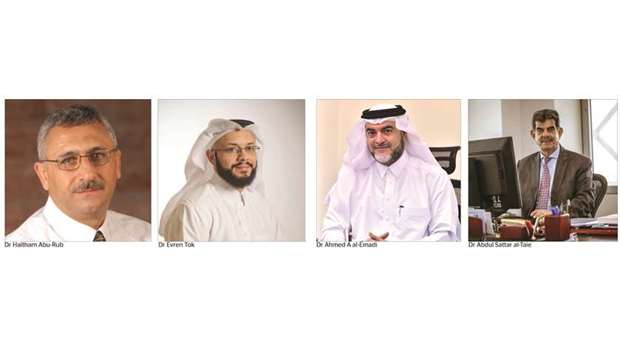Four research projects designed to contribute to Qatar’s development in the areas of global citizenship education, cybersecurity, environmental management and STEM education have been awarded grants by Qatar National Research Fund (QNRF).
Designed to address Qatar’s strategic challenges, the Qatar Foundation (QF) member’s National Priorities Research Programme-Cluster track (NPRP-C) aims to develop solutions that produce tangible societal and economic impact. Through this programme, QNRF supports multi-institutional and inter- or multi-disciplinary research to solve significant and complex problems that need an unconventional approach.
The NPRP-C encourages researchers from multiple institutions and disciplines to work on mega-research projects in areas of national importance, including energy, health, resource sustainability, society and digital technology. Under this cycle , QNRF received 25 initial proposals submitted by researchers in seven Qatar-based institutions with 10 shortlisted for the final round of evaluation, and four ultimately selected to receive funding for 3-5 years.
Dr Haitham Abu-Rub, professor at QF partner university Texas A&M University at Qatar, is the project director of one of the awarded projects, titled Multi-layer Cybersecurity and Situational Awareness to Enhance Resiliency in Qatar’s Power Grid. “The main motivation behind applying for this project is to contribute to building a smart grid cybersecurity infrastructure in Qatar,” he said.
“Our team of researchers from Texas A&M University at Qatar and Qatar Environment and Energy Research Institute (Qeeri) aims to create a cyber-physical security infrastructure for Qatar’s smart grid while addressing the challenges associated with cyber-physical security and situational awareness of Qatar’s power grid. We will also explore the development of critical infrastructure through the integration of cybersecurity mechanisms, machine learning, smart devices and multi-agent distributed networked proactive control strategy.
“The outcomes of this project will ensure the security of Qatar’s critical infrastructure by helping to protect Qatar’s smart grid and critical infrastructures from any cyberattacks, damage and energy disruption.”
Dr Ahmed A al-Emadi, professor and dean of the College of Education at Qatar University, has been awarded a grant for a project promoting sustainable development of K-12 STEM education in Qatar in the digital age. “STEM education and skills are now more important than ever, as a high quality of STEM education is critical for providing skilled graduates for growing number of STEM-related jobs, which are essential for economic growth and development in Qatar,” he said.
“Our project employs a comprehensive interdisciplinary approach that involves experts from multiple domains including pedagogy, affective and cognitive sciences, math education, pedagogy and engineering. “This approach will help us identify the challenges in STEM education and subsequently develop and design pedagogy that addresses development of STEM learning at K12 level. We also aim to apply and implement new technology designs to promote STEM education and propose sustainable development strategies.” A research project that aims to promote education about sustainable development goals (SDGs) and global citizenship locally has also been awarded a grant. Dr Evren Tok, associate professor at the College of Islamic Studies at QF member Hamad Bin Khalifa University (HBKU), said: “The overarching objective of our project is to provide applied solutions to educational challenges with the aim of providing evidence-based designs and piloting innovative educational modalities in Qatar.
“We will be pursuing a multi-layered approach and identify, design, implement and evaluate educational models and modalities by rescaling global citizenship and SDGs towards a process that is localised, contextually sensitive and centred on human values.
“Our team aims to produce a creative space in education ecosystem in Qatar which fosters the creation of multi-stakeholder, inclusive and co-ordinated educational spaces and applications to improve the awareness and knowledge of students about global citizenship and the SDGs and increase their levels of civic participation.”
The fourth project that received funding aims to develop an efficient and practical carbon management system to improve Qatar’s sustainability. Dr Abdulkarem Amhamed, Senior scientist and Energy Efficiency Programme director at HBKU’s Qeeri, said: “The motivation behind this project is to address the challenges faced by Qatar due to the perennial increase of CO2 concentration in the atmosphere, as it can affect indoor air quality and lead to issues relating to economic diversity and food security. “Addressing these challenges will put Qatar in the spotlight as a country that takes climate change seriously. Our project aims to take on the challenge of using an existing air-conditioning system to capture CO2 from the atmosphere effectively and economically. We aim to reduce atmospheric CO2 concentrations independent of the complexities of the global energy system, thereby connecting the problem to a solution. The success of the proposal will permit an unambiguous metric to assess effectiveness of direct air capture.”
Qatari stakeholders and research end-users that are collaborating with the research team and co-funding the project include the Ministry of Municipality and Environment, Kahramaa, Agrico and Qatar Shell as well as international partners.
Dr Abdul Sattar al-Taie, executive director of QNRF, said since the inception of the NPRP, the projects it funds have played an instrumental role in helping Qatar to build resilience in key sectors and develop evidence-based and sustainable solutions to its key challenges.
“As with every year, the quality of this year’s awarded research projects is exceptional,” he said. “I congratulate all the four project directors and the 20 lead principal investigators and their team researchers who will execute these research cluster projects, and wish them the best as they join us in our mission of fostering a thriving research ecosystem in Qatar.”
QNRF is now accepting applications for the thirteenth cycle of the NPRP-C, which will focus on four major thematic areas: national emergency preparedness, response and resilience; the clinical implementation of precision medicine; artificial intelligence and applications; and next Qatari society, which encourages researchers to study New and Emerging Technologies (N&ET) and their impact on the Qatari identity and social transformation.
For more details, visit www.qnrf.org.

..
